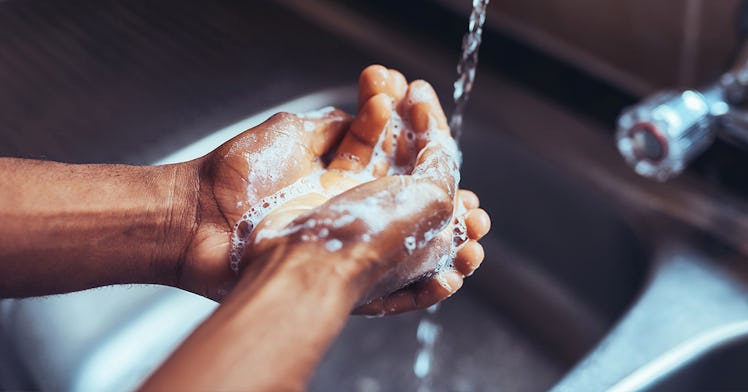Covid-19 Prevention: Does Hand Washing Still Matter?
Social distancing is more important, but you still need good old soap and water.

COVID-19 spreads mostly from person to person. Someone coughs or sneezes or talks, spewing respiratory droplets into the air. Those droplets land on another person’s face and the coronavirus infects them. This is the main route of transmission that fuels the pandemic. So why is everyone obsessing over hand-washing? Or, rather, should we still worry about it?
“If somebody coughs on a surface, it’s going to be very easily transmissible,” says John Carl, a pediatric pulmonologist at Cleveland Clinic Children’s. The virus remains viable on a variety of surfaces for hours, according to the Centers for Disease Control and Prevention. If a person touches a contaminated object and then touches their mouth, nose, or eyes before washing their hands, they could get COVID-19, Carl says. “One time is really all you need.”
However, this is not the main way the coronavirus spreads. “Transmission of coronavirus occurs much more commonly through respiratory droplets than through objects and surfaces, like doorknobs, countertops, keyboards, toys, etc.,” according to the CDC. In fact, no one has been able to pin any cases of COVID-19 to touching an object. But it can be difficult to trace exactly how an infected person picked up the coronavirus. People are probably getting sick from touching surfaces, Carl says.
Most people touch their faces frequently, so there are many opportunities for the virus to get from a contaminated doorknob to your mouth or nose. For example, medical students in a lecture touched their faces an average of 23 times per hour, according to a 2015 study. People with allergies are probably even more touchy. “When allergy season is in high gear, I probably do double that if not more,” Carl says.
Most of this face-touching is unconscious, which is why it’s so important to wash your hands frequently and thoroughly for 20 seconds each time. Be sure to do it before and after coming in contact with someone who is sick, going to the bathroom, going into public, and eating or prepping food. Always wash after sneezing or using a tissue. “It’s pretty easy to remember when you’re feeling lousy,” Carl says. But asymptomatic people can spread the virus too, so be just as diligent when you feel healthy. Like wearing a mask, it’s not just about you.
Despite the fact that hand sanitizers sold out at the beginning of the pandemic, soap and water is your best bet for cleaning your hands. “Soap and water is every bit as good if not better than the hand sanitizer,” Carl says. Hand sanitizer with at least 60% alcohol is a good alternative for when you’re on the run.
But hand-washing alone is not enough. Stay away from large gatherings because superspreading events are the biggest driver of the pandemic. In your everyday life, social distancing and wearing a mask is the best way to curb the spread of the coronavirus. Bonus, it also keeps your hands clean. More masks mean fewer particles spewed onto surfaces, and social distancing means particles from someone else’s mouth and nose are less likely to settle onto your hands, making them a contaminated surface of their own. So mask up and suds up. Keep your community and yourself safe from COVID-19.